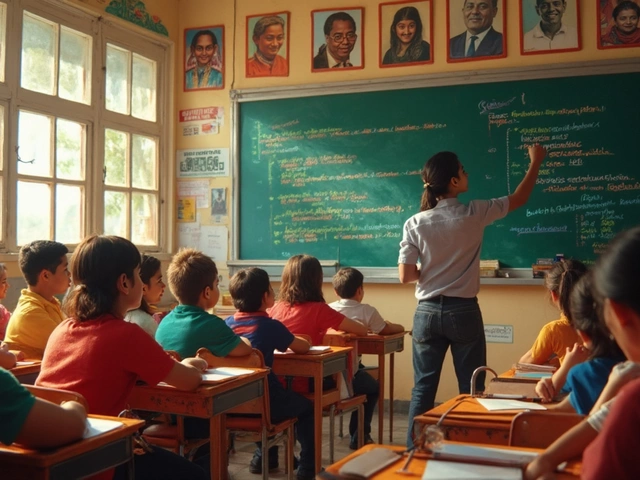The school board you pick shapes more than just your kid’s report card—it impacts their entire learning journey. Parents get flooded with advice and opinions, but it can feel like everyone’s just selling their own side. There’s one question I hear all the time: Is CBSE the best board for my child’s future?
If you’re stuck between CBSE and the other options, you’re not alone. CBSE isn’t just about tough textbooks or endless homework—there’s a lot more under the hood. Think of things like strong science and maths focus, heavy NCERT textbook use, and a system that tries to prep students for national entrance exams. Not all boards do this the same way.
I’ve seen families go back and forth over the decision for months. They worry about everything from college admissions to how much stress their child will handle. If you want solid info and real talk, not just school marketing jargon, you’re in the right place. Let’s break down the facts so you can see if CBSE fits your kid—and your family.
- CBSE at a Glance: What Sets It Apart?
- CBSE vs Other Boards: Real Differences
- Who Thrives in the CBSE System?
- Tips: Choosing the Right Board for Your Child
CBSE at a Glance: What Sets It Apart?
CBSE stands for Central Board of Secondary Education, and it’s one of the most popular school boards in India. If you walk into any city or town, chances are you’ll find a CBSE school nearby. Why do so many parents pick this board? One big reason: the focus on consistency and national standards.
The CBSE syllabus is known for sticking close to NCERT books—these are the textbooks used for everything from school exams to entrance tests for big-name colleges like IITs and medical institutes. The content is straightforward and not overloaded with unnecessary details, which can help kids form a strong base, especially in science and math.
CBSE schools give more weight to English, Hindi, science, and maths, while still offering subjects like social studies and IT. The system also follows a grading scale that’s standard across India, so a student in Punjab gets graded the same way as one in Tamil Nadu. Here’s a quick snapshot of what makes CBSE stand out:
- The same curriculum across India—no random changes school to school.
- Direct link to top Indian competitive exams like JEE and NEET (which both use NCERT content).
- Focus is on concepts, not mugging up facts (rote learning).
- CBSE is recognized by all central and state governments in India—no issues with transfers.
About 25,000 schools in India (and 240 in other countries) follow CBSE. That means even if you move, finding another CBSE school usually isn’t a hurdle.
Check out this quick comparison table to see how CBSE stacks up on basics:
| Feature | CBSE |
|---|---|
| Core Focus | Science, Math, Languages |
| Medium of Instruction | English/Hindi |
| Curriculum Type | Concept-based, NCERT-guided |
| Transferable | Yes, all over India |
| Exam Prep Alignment | Perfect for JEE/NEET |
So, if your family could get transferred or you’re eyeing those national entrance exams later, CBSE packs some serious advantages. Plus, kids get trained in logical reasoning and practical skills, not just memorizing lessons for exams. That’s a game-changer for many families.
CBSE vs Other Boards: Real Differences
Comparing the CBSE syllabus with other boards like ICSE, State Boards, or IGCSE is more than just about which has thicker textbooks. Each board shapes kids differently, both in skills and exposure.
CBSE stands out for how much it leans into science, maths, and national entrance exams. If your kid’s aiming for JEE, NEET, or similar tests, the CBSE curriculum fits naturally—the questions, format, and concepts are all mapped to these exams. ICSE and IGCSE, meanwhile, focus more on language and detailed, project-based learning. Some kids thrive in that, but it’s not for everyone.
Let’s talk about the study load. CBSE textbooks (mainly NCERT) get straight to the point. They cut down on bulk but still cover what matters. ICSE books go longer and deeper, especially in English. State Boards are all over the place—some make it easy, others pile on rote learning.
If you’re thinking about moving cities because of work, CBSE has a network everywhere. Whether it’s Chennai, Lucknow, or Dubai, you’ll almost always find a CBSE school with the same curriculum. That beats State Boards, which can feel like entering a new planet if you switch states.
Here’s a quick comparison that sums up some of the key differences:
| Feature | CBSE | ICSE | State Boards |
|---|---|---|---|
| Subjects Emphasized | Science, Maths | Languages, Art, Theory | Varied (depends on the state) |
| Textbooks | NCERT | ICSE Board Books | State Board Books |
| Exam Prep Focus | All India (JEE, NEET, etc.) | Overall development, foreign exams | Local/state entrance |
| Mobility | Easy, national/international | Limited | Limited |
The truth is, CBSE isn’t always the right answer, but it does fit really well for kids aiming for national level exams. If you want more options for arts, languages, or less exam stress, other boards might work better. It boils down to your child's interests, strengths, and even your own job’s location flexibility.

Who Thrives in the CBSE System?
Not every child learns the same way, and the CBSE syllabus is definitely built with a certain type of student in mind. If your kiddo is aiming for India’s big competitive exams like JEE, NEET, or UPSC, CBSE is almost like home base. The board’s focus lines up directly with these exams, using the exact NCERT books and drilling the same concepts year after year.
Kids who are strong in science and maths usually find CBSE comfortable. The system goes deep on these subjects, so if your child enjoys problem-solving, analytical thinking, or just loves numbers and experiments, they’ll fit right in. Plus, the style of assessment—with more objective questions and less emphasis on super-long answers—benefits kids who are direct and to the point.
Another big plus: families that move around India (or even abroad) find CBSE super handy. It’s recognized in almost every major city, and there are plenty of affiliated schools even outside the country. Transferring schools won’t throw a wrench in the learning process, which can be a lifesaver for kids glued to a routine.
That said, CBSE can sometimes be a lot for students who learn best through art, storytelling, or out-of-the-box projects. The board leans into structured learning and less on open-ended exploration, so creative kids might feel boxed in at times. Language lovers may notice less focus on literature or regional languages compared to other boards.
If you’re still wondering who exactly does well in CBSE, check out this quick comparison:
| Type of Student | How They Fit in CBSE |
|---|---|
| Analytical and science-oriented | Great fit, enjoys the structure and clear concepts |
| Exam-focused learners | Adjusts easily, as CBSE mirrors patterns of major competitive tests |
| Relocating families | Transition smoothly, same syllabus everywhere |
| Creative, project-driven kids | May find environment a bit restrictive |
If you’re aiming for steady learning and national-level exam prep, CBSE could be a solid match. For those wanting more flexibility and freedom in learning styles, look at other boards too. It’s really about finding the groove that makes your child thrive—not just survive at school.
Tips: Choosing the Right Board for Your Child
Picking the right board isn’t a one-size-fits-all deal. What works for one kid might not suit another. So, before getting caught in the classic CBSE vs others debate, flag what matters most for your family and your child’s strengths.
- CBSE syllabus is known for its science and math strength, and most national entrance exams (like JEE and NEET) are based on its content. If your child thinks they’ll go for engineering or medicine, CBSE can give them a head start.
- Check how often your family moves. CBSE schools are all over India, so switching schools mid-year is much smoother. For parents with transferable jobs, this flexibility is a game-changer.
- Look at your child’s interests. If they’re into humanities, arts, or project-based learning, other boards like ICSE or IB might offer richer options. These boards often score better for English and real-world application.
- Think about stress levels and learning style. Some boards have heavier workloads, more internal assessments, or encourage critical thinking over rote learning. CBSE keeps things pretty straightforward—good for kids who do well following a clear structure.
Here’s a direct comparison on some essentials:
| Board | Exams Aligned | Nationwide Reach | Subject Focus |
|---|---|---|---|
| CBSE | JEE, NEET, NDA | Nationwide | Science, Maths |
| ICSE | No direct alignment | Urban areas mostly | English, Arts |
| State Board | State entrance tests | Statewise | Regional content |
Don’t forget, there’s no "perfect" board. Life skills, confidence, and happiness aren’t only about exam scores. As cheesy as it sounds, your child’s enthusiasm matters more than the label on their books. Take a school tour, talk to other parents, and see where your child actually fits in before signing up for anything. If possible, ask your child how THEY feel about the options—kids know more about their comfort zones than we give them credit for.






Write a comment: